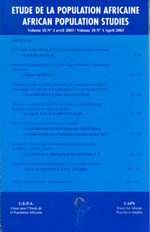
|
African Population Studies
Union for African Population Studies
ISSN: 0850-5780
Vol. 17, No. 1, 2002, pp. 47-67
|
 Bioline Code: ep02003
Bioline Code: ep02003
Full paper language: English
Document type: Research Article
Document available free of charge
|
|
|
African Population Studies, Vol. 17, No. 1, 2002, pp. 47-67
| en |
Ghana's Reproductive Revolution: Analysis of the Determinants of Fertility Transition
Chuks, J.
Abstract
The present article examines trends in the proximate determinants of fertility in Ghana over a decade (from 1988 to 1998) with a view to finding out their contributions to reproductive change and whether the reported fertility decline was a product of short-term fluctuations in fertility or reporting errors or the commencement of a sustained decline in completed family size. Using the Ghana Demographic and Health Surveys data sets of 1988, 1993, and 1998, the findings show that postpartum infecundability has a far more dominant inhibiting effect on fertility than the other proximate fertility determinants. Specifically, the fertility suppressing effects of postpartum infecundability are more important than the effects of contraception, and marriage patterns in explaining fertility levels and trends in Ghana. The findings of the study further show that both age at first marriage and age at first birth have increased in Ghana during 1988-1998 period, thus confirming the reproductive revolution currently underway in Ghana. However, the greatest change has been noticed among the youngest age group, as well as among women with higher education, and who live in urban areas, and Greater Accra, Ashanti, and Eastern regions.
|
| |
| fr |
Chuks, J.
Résumé
Dans cet article, l'auteur examine les tendances sur une période de 10 ans (1988-1998) de la fécondité au Ghana pour déterminer leurs contributions à l'évolution de la reproduction et voir si la baisse de la fécondité dont on parle résulte de fluctuations à court terme, d'erreurs dans l'analyse ou est le démarrage d'une diminution durable de la taille de la famille. En partant des données des Enquêtes de Démographie et de Santé (EDS) du Ghana des années 1988, 1993 et 1998, les résultats ont montré que l'infécondité post-partum a un effet beaucoup plus marqué sur la fécondité que les autres déterminants immédiats de la fécondité. En particulier, les effets de suppression de la fécondité de l'infécondité post-partum sont plus importants que ceux de la contraception et des types de mariage dans l'explication des taux et des tendances de la fécondité au Ghana. En outre, les résultats ont également montré qu'au Ghana, l'âge au premier mariage ainsi que l'âge à la première naissance ont tous deux augmenté pendant la période considérée, ce qui confirme la révolution actuelle en matière de reproduction dans ce pays. Cependant l'évolution la plus importante s'est faite chez les groupes les moins âgés ainsi que chez les femmes qui sont parvenues à l'enseignement secondaire et qui habitent dans les zones urbaines comme le Grand Accra et les régions Ashanti et orientales.
|
| |
© Copyright 2002 - Union for African Population Studies
Alternative site location: http://www.uaps-uepa.org
|
|
